Honoring World Mental Health Day: Let’s Rethink How We Support Our People
October 6, 2025
In honor of World Mental Health Day this year, HR and benefits leaders are taking the opportunity to re-evaluate how their organization supports employee well-being.
Because when you better understand your employees as full people, you can begin to implement holistic care solutions that keep them healthy and happy. You stop reacting to symptoms of employee stress, and start to proactively build workplaces that protect from the kinds of stress that are hazardous to employee wellbeing and job performance.
The traditional wellness vendor approach tends to treat employee mental health as an individual-level problem, with minimal collaboration among organizations and their benefits partners. Companies that want to help stressed employees might offer a menu of one-off benefits, like yoga classes, meditation apps, or individual therapy sessions.
While all of these solutions are useful, they’re not enough by themselves. This approach manages surface-level challenges without addressing what’s causing them—whether that’s work-related stressors that call for systemic solutions, or personal issues like caregiver burden or childcare needs that go beyond what individual therapy can address. Like giving cough drops to someone with strep throat, they might temporarily ease pain, but they won’t make the underlying infection go away.
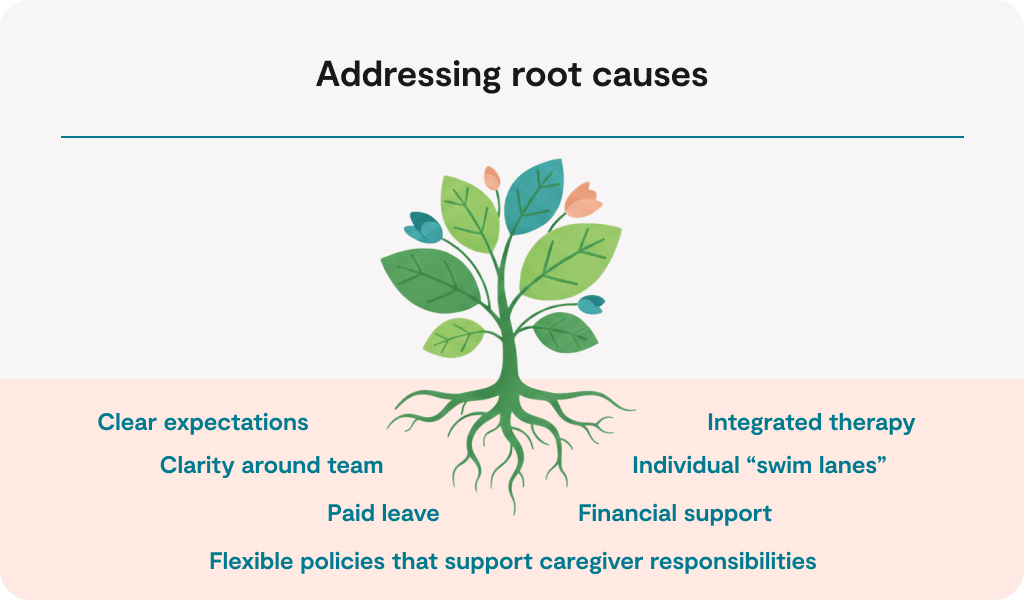
Addressing mental health effectively requires turning the workplace into a strong community of care. This means treating mental health as an organizational responsibility and creating a culture of sustainable work that supports employees both at work and at home.
As part of World Mental Health Day, we’re providing managers with practical resources for preventing burnout, addressing workplace loneliness, and fostering psychological safety. Get the “Manager’s Toolkit” here.
A culture of sustainable work thrives on three key elements: workplace transformation, whole-family support, and culturally responsive care.
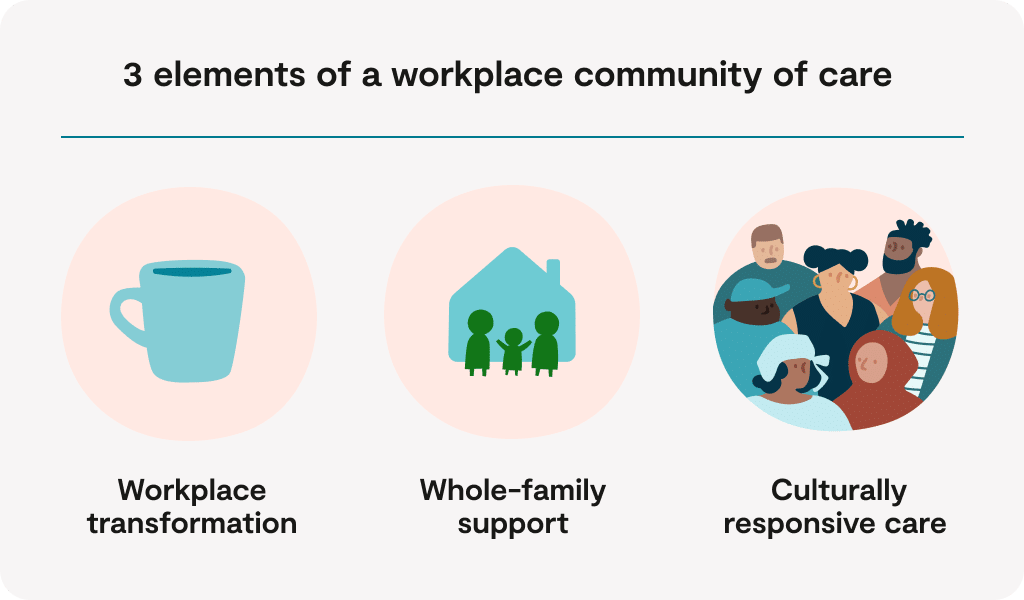
Workplace transformation: Addressing the root causes of stress and burnout, not just symptoms
Almost one-third of employees today list work-related stress and burnout as their top mental health concern, highlighting the importance of direct workplace interventions to support employee wellness.
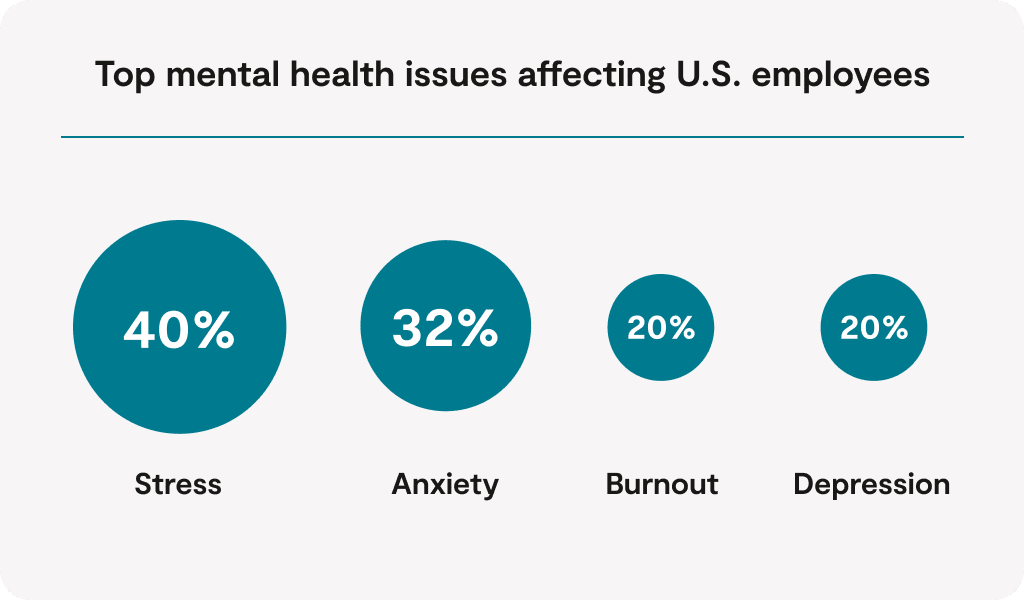
Creating a strong community requires evaluating the working environment to identify factors that contribute to mental health challenges, which can be complex. At work, these factors could include unclear role expectations, poor working conditions, or lack of support from a manager. Stress and burnout are systemic issues, so organizations must change how they operate rather than simply provide employees with tools to manage issues on their own. At home, they might include navigating caregiver responsibilities and financial pressures.
What you can do:
- Include thorough overviews of wellness benefits as part of new employee onboarding, manager training, and internal community resources. Routinely remind your employees of the resources available to them.
- Managers have a profound impact on employees’ day-to-day lives—but 40% lack confidence in supporting employees with mental health challenges. Give your managers the training and tools they need to help their teams prioritize wellness. Start by conducting role clarity exercises to identify gaps between manager and employee expectations and align teams.
- Set individual, team, and company-level goals that are related to employee wellness, such as retention rate, employee engagement scores, and time-to-fill open positions.
- Develop events programs that invite employees and leaders to share stories about their mental health struggles and how resources like clinical therapy have helped them.
Ready to make lasting changes in your work environment? Our Workforce Transformation team is here to help.
Whole family support: Benefits that extend to home life
What happens at home doesn’t always stay at home. When employees worry about their family members, like their children and parents, it becomes more difficult for them to focus and fully engage with their peers.
More than half of working parents in the US support children struggling with mental health. One in three parents in this situation report a decline in their own mental health, with many of them expressing that their mental health challenges have a “strong” or “significant” impact on their ability to do their job.
When families receive proper support, employees are better equipped to do their best work. Rather than suffering from burnout that may force them to leave the workforce altogether, they have the energy to collaborate with their colleagues and grow within their role.
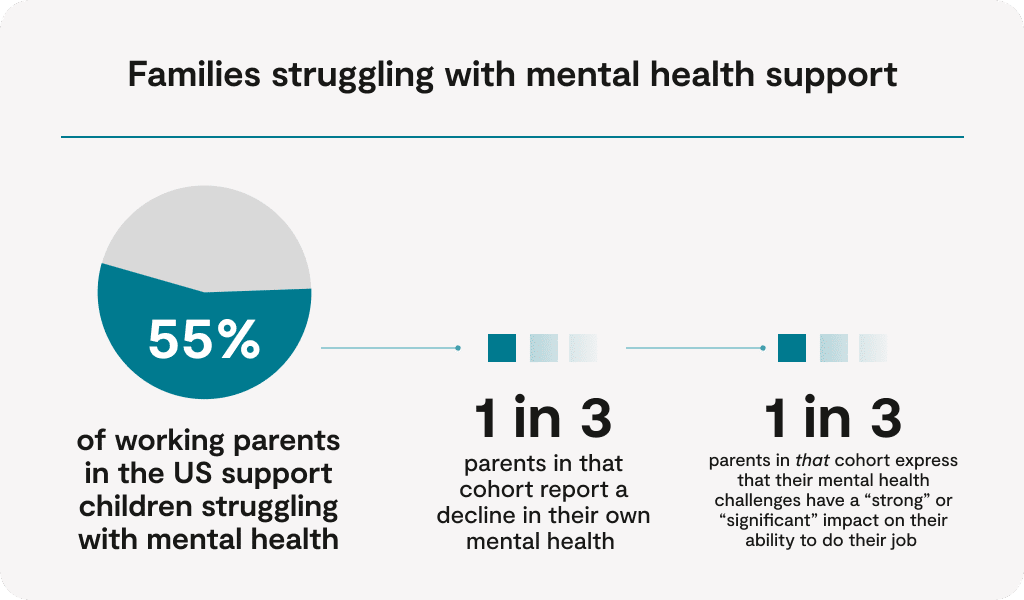
When you build your baseline policies around the people most in need of support, you inevitably create work environments that are better for everybody. For example, sick leave and flex work policies that support single parents will also be better for employees with other family structures, creating a culture that values work-life integration and driving retention and overall job satisfaction.
A rising tide lifts all boats.
What you can do:
- Make sure your mental health benefits include specialized offerings for children and teens, from educational content to coaching and therapy options. Offer personalized care solutions for common mental health challenges, such as Autism Spectrum Disorder.
- Connect parents and caregivers with personalized coaching that helps them build skills to navigate unique parenting challenges.
- Go beyond individual therapy to offer couples therapy and family therapy benefits.
- Provide comprehensive dependent care assistance, including backup childcare and elder care support.
- Create realistic parental leave policies and structured return-to-work plans that include phased re-entry options and ongoing check-ins for employees transitioning back after parental or FMLA leave.
Lyra can work with you to offer coaching and specialized support for employees and their family members, including for children and teens.
Culturally responsive care: Benefits that acknowledge everyone’s perspective
Mental health support only succeeds when it prioritizes cultural understanding.
Employees need to feel genuinely understood and valued for who they are, without having to constantly explain their background or experiences. Cultural alignment helps prevent employees from having to take on the burden of educating their provider about their experiences while trying to work through the challenges they face.
For example, Kamila Jones, a Lyra client and senior project engineer at JE Dunn, suffered from panic attacks driven by a combination of work and home stressors. After working unsuccessfully with multiple therapists who didn’t understand her cultural background, her employer connected her with a Lyra provider who shared her identity as a woman of color in a specific age range.
“The things we deal with on a daily basis come from when we grew up and the environment we were raised in,” she shares.
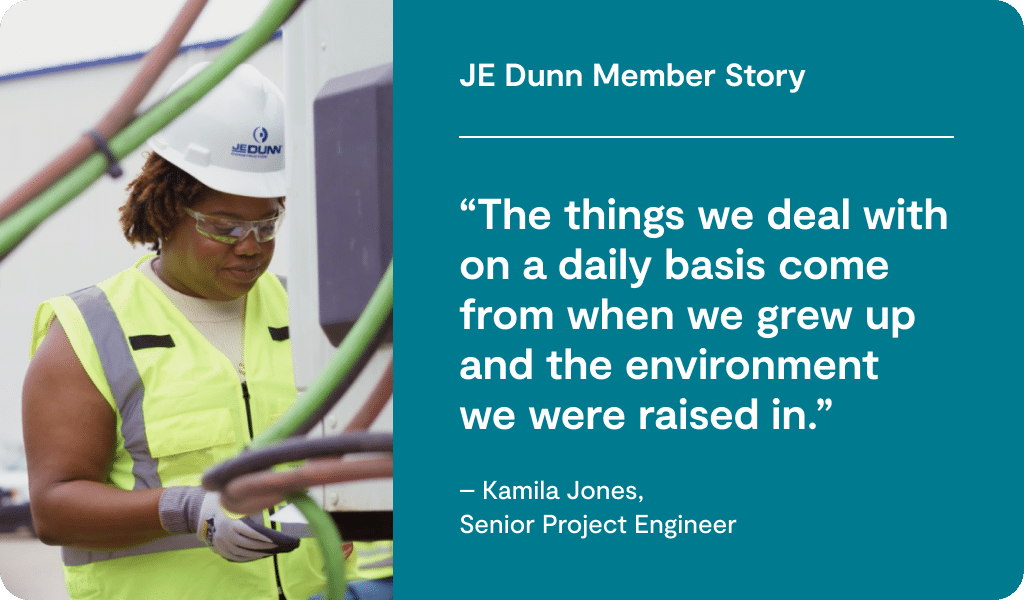
Cultural competence makes mental health care more accessible and effective for LGBTQIA+ communities, Black, Indigenous, and people of color (BIPOC) employees, and other underrepresented populations.
What you can do:
- Establish employee resource groups to support employees with specific identities and backgrounds. Provide resources and budget for employees to launch and run organization-backed communities to discuss issues, share how they’re using relevant resources, and celebrate their voices.
- Identify internal advocates who understand local cultures and employee backgrounds to run group sessions, ERGs, and cultural events.
- Partner with mental health providers who can offer care in multiple languages and understand diverse cultural approaches to wellness.
- Ensure your training and internal communications reflect diverse family structures, cultural backgrounds, and life experiences.
Lyra can help you make this outcome a reality for all your employees, by connecting them to our diverse network of providers trained in culturally responsive care.
A shared journey
World Mental Health Day reminds us that mental health is a shared journey.
Mental health challenges don’t take shape in isolation—factors at work and at home all play a role. Every individual deserves holistic support that acknowledges their unique experience and helps them connect the dots to the resources, care, and community that can help them. By understanding your people, you can begin to guide your organization to tackle the root issues that impact your employees.
The most productive, forward-thinking organizations build strong communities of care. They treat mental health as a collective, organizational responsibility and create a culture of mental well-being.
By focusing on the these elements, organizations can proactively address mental health challenges at their source:
- Workplace transformation tackles organizational stressors before they drive burnout and turnover.
- Home support addresses family stressors before they derail work performance.
- Cultural alignment ensures that these support is accessible and effective for everybody.
When you build systems that support employees as the whole people that they are, they thrive—and your organization does too.
Ready to start building a safety net that helps every employee?
Author
The Lyra Team
The Lyra Team is made up of clinicians, writers, and experts who are passionate about mental health and workplace well-being. With backgrounds in clinical psychology, journalism, content strategy, and product marketing, we create research-backed content to help individuals and organizations improve workforce mental health.
Explore additional blogs

Mental health at work
When Hustle Breeds Burnout: What Gen Z Wants from Work

Mental health at work
Setting Boundaries at Work: A Key to Well-Being

Mental health at work